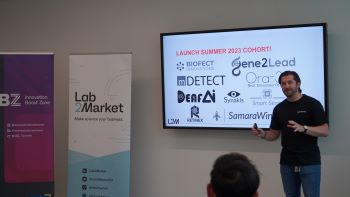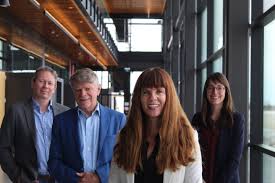Pilot program for young entrepreneurial academic researchers expands across Canada
 A pilot program to help grad students and post-docs build entrepreneurial skills and consider creating startups based on their academic research has grown over three years into a national endeavour.
A pilot program to help grad students and post-docs build entrepreneurial skills and consider creating startups based on their academic research has grown over three years into a national endeavour.
Lab2Market has to date served more than 500 teams of students in STEM graduate programs and post-doctoral programs from 33 distinct institutions across Canada. (Photo at right: launch of a Lab2Market program at Toronto Metropolitan University)
With help from a suite of Lab2Market programs, the teams have incorporated 58 companies, launched 25 startup businesses and raised more than $13.8 million in private and public funding.
“Our goal from the beginning has been to run this [initiative] at a national level,” Jeff Larsen, assistant vice-president, Innovation and Entrepreneurship, at Dalhousie University, told Research Money. “We see that as how we get the scale needed to run a program at the quality level that we want, and run that quality in a sustainable way.”
Canada excels at world-class research, but lagged in generating commercial startups and growing them into large firms that boost the country’s productivity.
“We saw the need to have a process based on world-class, best-in-class programs to get more and better ventures coming out of the research,” John MacRitchie, assistant vice-president, Zone Learning and Strategic Initiatives, at Toronto Metropolitan University, said in an interview.
Along with Lab2Market’s performance results to date, Larsen and MacRitchie both underscored the importance of the entrepreneurial skills-building for young academic researchers, and connecting their research with real-world problems in industry.
“It’s that experience of trying to build something, thinking about how do I build a new venture out of the research that I’ve got,” MacRitchie said.
The initial two-year Lab2Market pilot program was launched in 2020 with more than $2.6 million from the Atlantic Canada Opportunities Agency, Federal Economic Development Agency for Southern Ontario, and Mitacs.
Innovation, Science and Economic Development Canada helped conceive Lab2Market’s pilot program and have been supportive of the work to expand it, Larsen said.
Lab2Market’s current national initiative is funded by a combination of Regional Development Agencies, sometimes provincial governments (in Quebec, it’s the Fonds de recherche du Québec), the Natural Sciences and Engineering Research Council of Canada, and Mitacs (with operational funding).
The 13 delivery partners, including universities and innovation hubs, are represented on a committee that delivers Lab2Market. All members contribute “people time,” Larsen said. “There’s a lot of sweat equity happening between the partners.”
It costs about $4.5 million to $5 million to run 10 cohorts, each consisting of approximately 20 teams of grad students and post-docs, through Lab2Market’s “Validate” program, in which teams evaluate their research as a potential business opportunity, he said.
Federal Budget 2022 allocated funding to pursue a national Lab2Market platform and the associated consultations, including:
- $47.8 million over five years, starting in 2023-24, and $20.1 million ongoing to ISED to launch a new national lab-to-market platform to help graduate students and researchers take their work to market; and
- $10.6 million over five years, starting in 2022-23, and $2 million ongoing to ISED to launch a survey to assess the government’s previous investments in science and research, and how knowledge created at post-secondary institutions generates commercial outcomes
However, none of that $47.2 million for ISED to pursue a national lab-to-market platform has started to flow, and ISED has yet to launch the survey.
The government has consulted with stakeholders on both initiatives and work on the design and implementation is ongoing, Andréa Daigle, a spokesperson for ISED, said in an email to Research Money. “Further details will be made available when these initiative are launched.”
MacRitchie and Larsen said they’re optimistic the money will start to flow by late this fiscal year, which for government ends March 31, 2024. If that happens, the current national Lab2Market initiative they’re involved in intends to apply for funding.
Participants supported throughout entire entrepreneurial journey
 Lab2 Market is modelled on the U.S. National Science Foundation’s Innovation Corps (I-Corps) and Innovate UK’s ICURe (Innovation to Commercialisation of University Research programs, launched in 2011 and 2014 respectively. The Canadian program also has added elements of MIT delta v, MIT’s student venture accelerator program. (Photo at right: Lab2Market teams connecting with each other)
Lab2 Market is modelled on the U.S. National Science Foundation’s Innovation Corps (I-Corps) and Innovate UK’s ICURe (Innovation to Commercialisation of University Research programs, launched in 2011 and 2014 respectively. The Canadian program also has added elements of MIT delta v, MIT’s student venture accelerator program. (Photo at right: Lab2Market teams connecting with each other)
“There are other jurisdictions that are seeing this [strategy for support of young academic entrepreneurs] as good practice, with some evidence that it works,” MacRitchie said. “So we’ve been trying to bring this here – how do we adapt this to the Canadian environment?”
For example, QsSE is the source for Lab2Market's "Discover" program, homegrown in Quebec and led by Concordia University.
Lab2Market collaborates with and receives advice from longer-running similar programs in the U.S. and U.K. Lab2Market’s Validate program works with VentureWell, a non-profit that facilitates I-Corps and many other initiatives for faculty and student innovators.
Lab2Market now delivers a suite of four programs called Discover, Validate, Launch, and Build. Each program guides young academic researchers through every step of their entrepreneurial journey, including:
- Discover if entrepreneurship is right for you through an online exploratory program, by learning a new way of thinking and determining if you have a passion for business.
- Validate your idea as a business, by critically evaluating and stress-test your research as a potential business opportunity.
- Launch your business in the real world, by building your business case, preparing for funding rounds and becoming a startup.
- Build your idea into a market-ready product, by acquiring comprehensive knowledge about all aspects of product development in a 12-month program for Canadian research teams working in the natural sciences and engineering disciplines.
“The No. 1 reason why startups fail is they build a product nobody wants,” Larsen noted.
Lab2Market teams are required to continuously talk with potential business customers to determine their real-world needs and whether the proposed product has a market. Each team’s target is to do 100 customer interviews.
Lab2Market provides a $15,000-stipend to grad students and post-docs in the 16-week, full-time Validate program. For the 12-week Launch accelerator program in the summer, individual teams (typically two to three people) receive up to $15,000 in funding.
In a pilot program with the Natural Sciences and Engineering Research Council of Canada, Lab2Market has run three cohorts in the Validate program funded through NSERC’s I2I (Idea to Innovation) market assessment grant. Toronto Metropolitan University leads the delivery of this program.
I2I involves doing a pre-market assessment of proposed technology originating from the university and college sectors, which typically involves the team of entrepreneurs hiring a consultant to do this assessment.
As an option for Lab2Market’s Validate program, NSERC is providing $25,000 per team to cover the cost of the teams themselves doing the assessment.
In a further expansion of the initiative, Lab2Market is now offering its new Build program, funded through NSERC’s Phase 1 grant and delivered by Toronto Metropolitan University. Build includes a curriculum developed by industry experts, mentorship from ex-startup founders and investors, and up to $155,000 in funding.
“With L2M Build, we have the opportunity to broaden Lab2Market’s continuum of programs to support every stage of research commercialization in Canada: Discover, Validate, Launch, and Build,” Larsen said.
In addition, Lab2Market this summer completed the first national Launch Health cohort, focused on health-based ventures.
Providing young academic researchers with more opportunities
Approximately 450 students and post-docs from across Canada have now co mpleted various Lab2Market programs.
mpleted various Lab2Market programs.
Along with the 25 startups created, 162 teams are continuing to pursue commercial development of their technology. Plus, teams completing the Launch program have created 107 jobs and generated $723,000 in sales. (Photo at right: Lab2Market teams involved in a pitch session)
Not every grad student or post-doc in Lab2Market will become an entrepreneur, and not every team will go on to create a startup, MacRitchie and Larsen said.
But they both emphasized that a main goal of Lab2Market is to expose young academic researchers to industry’s and the market’s perspectives. Grad students and post-docs can then consider these perspectives and perhaps modify their research if they decide they want to produce innovative products for real-world problems.
“This program is very practice-based,” MacRitchie said. “It’s getting that interaction happening, helping them [grad students and post-docs] get the confidence to do that, getting that work done to get out there and have those conversations that add capacity to what they’re doing.”
The limited number of academic track positions available means that 80 to 85 per cent of PhD students – the top calibre of Canada’s highly qualified personnel – will not become professors, Larsen said.
Lab2Market provides these young academic researchers with the necessary skills and competencies to give them the option to start a company or to take their skillsets and knowledge into industry, he said. “This gives them other opportunities, and opportunities that can have a big impact on the country.”
The common denominator for grad students and post-docs approached about participating in Lab2Market is that they want their research to make an impact in the real world, Larsen said.
“They may not want to start a company. They might think that has nothing to do with whatever they would imagine,” he said.
“But when they learn these skills and competencies, and that one of the ways to potentially make that impact is through a company, you find people who would never have thought of themselves in that context,” Larsen added. “So many of the entrepreneurs are people who would never have thought they were."
Lab2Market also is having an impact on faculty members who see the value of the program for their students and post-docs, MacRitchie said. At Toronto Metropolitan University, involvement in Lab2Market by a Canada Research Chair in disruptive transportation aided him in raising additional research funding for his Chair, because the program helped him understand how to present his work from a different, business-oriented perspective.
Entrepreneurial team developing seaweed-based bandages
In June, Lab2Market and Dalhousie University announced 20 entrepreneurial teams for the 2023 Launch accelerator, offered through Dalhousie’s Dal Innovates entrepreneurial hub.
The teams, comprising 43 students and recent graduates from 14 post-secondary institutions across Canada, will form, build and grow their ventures over 12 weeks.
During the summer, teams were engaged in conducting primary market research, defining their beachhead market, learning about customers’ and users’ needs, validating and quantifying the product value proposition for customers, building their founding team, developing their business model, and making progress on starting their venture.
In addition to up to $15,000 in funding, each team receives tailored instruction, mentorship and coaching from successful entrepreneurs and industry experts, and guidance and assessment from a Founder Council comprised of business leaders.
A Concordia University team participating in Launch has created a startup, based on their academic research, called Miha Biotech that aims to develop and commercialize a wound dressing, or bandage, made from extracts of naturally growing seaweed.
Specific marine algae have the ability to keep wounds moist and clean, which is important to facilitate proper wound healing, materials scientist Dr. Minh-Hai Tran, PhD, a post-doctoral fellow at Concordia University and co-founder of Miha Biotech, explained to Research Money. “It is incredibly effective for treating burns [and other wounds], promotes healing without leaving significant scars, and can be used on sensitive skin including that of children.”
The prototype bandage for burns that Miha Biotech is currently developing is specifically designed to provide a moist environment and cool layers of the skin, including deeper layers affected by a burn, said Dr. Milad Hadaeghnia, PhD, a post-doctoral researcher in mechanical engineering at Concordia University and co-founder of Mia Biotech. The bandage helps minimize rapid loss of blood into the burn bed due to the heat.
“We use materials that are extracted from seaweed, which is a bio-source. So we reduce the medical waste [from used wound bandages] this way,” Hadaeghnia said.
Tran said the participation by Miha Biotech’s team in Lab2Market has been “incredibly beneficial,” by enhancing the team’s collaborative workflows and expanding and refining its business links.
A Lab2Market mentor, who meets weekly with the team, has helped increase the team’s understanding of business concerns, encouraged practical solutions to meet real-world needs, and boosted the team’s confidence, she said. “The program gives us the recipe on how to develop a business and see the next steps we need to do together as a team.”
Added Hadaeghnia: “You can get feedback from a wide range of expertise, which can be very beneficial for someone like us with scientific mind-sets and little knowledge about business”
Tran and Hadaeghnia both said one of the most valuable aspects of Lab2Market is learning to talk with potential customers and getting their perspective on the solutions they need.
“Becoming an entrepreneur helps you become a better scientist, because you can see the bigger picture. It broadens your horizon,” Hadaeghnia said.
Miha Biotech has landed its first provincial grant, $15,000 from from CRIBIQ’s (Quebec Industrial Bioprocesses and Innovation Consortium) CRIBIQ-BIOnext program.
“We want to make a connection between our academic research and what the real world wants,” Tran said. “Our plan is to take our innovation and make it successful in the market.”
Photos: courtesy Dal Innovates and Toronto Metropolitan University.
R$
Events For Leaders in
Science, Tech, Innovation, and Policy
Discuss and learn from those in the know at our virtual and in-person events.
See Upcoming Events
You have 0 free articles remaining.
Don't miss out - start your free trial today.
Start your FREE trial Already a member? Log in
By using this website, you agree to our use of cookies. We use cookies to provide you with a great experience and to help our website run effectively in accordance with our Privacy Policy and Terms of Service.





